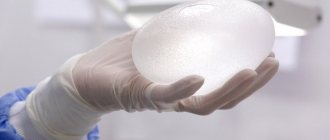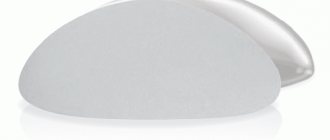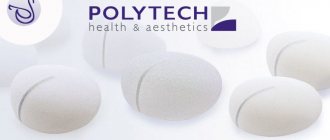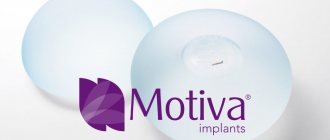Discussions and disputes regarding the choice of breast implant shape remain relevant. The correct choice of implant is one of the components of the success of mammoplasty, which concerns both the patient’s final perception of the new shape of her bust and minimizing the risk of developing postoperative complications and negative consequences.
Breast implants can be of various shapes – round and anatomical. According to popular opinion, anatomical implants, unlike round ones, give the breast a natural appearance and natural softness when touched. In fact, this statement has no serious basis.
Characteristics of breast implants
Implants intended for mammoplasty differ in the following characteristics:
- form;
- volume;
- projection;
- surface texture (smooth or textured).
The choice of implant is made by the surgeon depending on the surgical goals and techniques, anatomical features and personal preferences of the patient.
The natural shape of the breast is not round, but teardrop-shaped. The gradual increase in breast volume begins with a flat slope in the upper region, rising in its lower part. Therefore, anatomical implants that imitate the effect of gravity on the breasts look more natural at first glance and are ideal for creating breast shape. Initially, they were developed for reconstructive operations (for amputated or injured mammary glands).
However, despite the fact that the installation of anatomical implants seems quite logical, many surgeons and patients prefer to use round endoprostheses for mammoplasty.
Compared to anatomical ones, the use of round-shaped implants allows you to achieve greater volume and height of the breast, creating a beautiful neckline. However, not all women are delighted with the large volume in the upper part of the breast, considering this shape unnatural and preferring anatomical implants as the most natural.
Round implants can indeed add unnaturalness and artificiality to the outline of the bust. For example, this can happen if a patient insists on installing a large-volume implant high on her chest, while the volume of her own mammary gland tissue is insufficient. In this situation, it is not the shape of the implant that is to blame, but other factors that must be taken into account before mammoplasty. Implants of any shape can look fake. This depends on the suitability of the implant and the woman’s individual body contours. Sometimes round implants look more “anatomical” than the actual anatomical ones.
Round implants implanted into the mammary glands generally “behave” more naturally than teardrop-shaped ones. In the vertical position of the patient, under the force of gravity, they independently acquire an anatomical, natural shape. Round implants also have a more advantageous appearance when the woman is in a horizontal position. Anatomical implants “give themselves away” by their lower part sticking up, while a woman’s natural breasts, according to the laws of gravity, blur. Round implants look more natural when lying down. Round implants also look more natural during active movements of a woman - jumping, running, dancing, etc.
Immediately before performing augmentation mammoplasty, the surgeon must take into account many factors - both the woman’s wishes about the shape and size of the breast, and the aesthetic vision of the doctor about the need to choose certain approaches. The surgeon is the patient’s ally, so the woman should listen to his opinion. It is the close tandem of the patient and the doctor that ensures consistently good results and satisfaction from the work done.
The surgeon's many years of experience gives him the opportunity to make an informed decision about the brand of implant, its size, access for mammoplasty and many other nuances of the operation.
On the day of breast augmentation
- We invite the patient to the clinic at the appointed time. You need to take a package of ready-made tests, a passport and money with you.
- The intervention with the use of breast endoprostheses is performed under general anesthesia, so the last meal is allowed the night before.
- An anesthesiologist and resuscitator speaks with the patient. The doctor draws special markings on the body. The operating team prepares the patient for the intervention.
- At the end of the intervention, the patient is transferred to the recovery room, where, under the supervision of specialists, she comes to her senses.
- The woman spends a day in the ward, the next day she goes home to recover. The doctor sets dates for dressings.
READ ALSO: Breast augmentation marked the beginning of my new life
Round implants
A characteristic feature of round implants is that the height of the implant is equal to the width of its base. The point of maximum projection is located under the center of the implant base. Thus, the difference between all round implants of the same width lies in the size of the projection.
When placed in the tissue of a patient in a standing position, round implants may appear somewhat teardrop-shaped. This degree depends, first of all, on how high the density or compliance of the shells and filler of the implants is, as well as the properties of the patient’s tissues. When a round implant is placed under the pectoral muscle, the teardrop shape increases, in contrast to its supramuscular location, which is explained by the pressure of the pectoral muscle on the upper pole of the implant.
Rehabilitation
Wearing special underwear is not the only thing that the patient must observe after the intervention.
- Hand loading is prohibited
Within 2 weeks. This causes implant displacement and impairs tissue healing.
- Don't sleep on your side
Sleep only on your back for 2 weeks. Sleeping on your side and back can easily damage the seam or dislodge the implant.
- 2 weeks without a car
For the first 2 weeks, you should refrain from driving.
- Alcohol and smoking are prohibited
These bad habits negatively affect the condition of the blood vessels and tissues of the human body.
- Gym, sauna, solarium – three months after implant placement.
Physical activity and high temperatures increase swelling, affect the position of the implant, and provoke the formation of seromas.
⇒
Teardrop-shaped (anatomical) implants
These implants are called anatomical due to the fact that this shape most closely matches the natural shape of the mammary gland. The main feature of teardrop-shaped implants is the location of the point of maximum projection of the implant below the center of its height, i.e. at the bottom of the implant. The vast majority of anatomical implants have different widths and base heights.
The main criterion for distinguishing teardrop-shaped implants with the same base width from each other is not only the size of the projection, but also different heights, which makes it possible for manufacturers to create wide universal model ranges of implants of the same style, differing in width, height and projection.
Thanks to this diversity, the surgeon has the opportunity to select the required shape of the implant for almost any variant of the anatomical features of the mammary glands.
POLYTECH® implants
Modern plastic surgeons note a number of advantages of German-made POLYTECH® implants. They have a modular structure, thanks to which a base with a width of 70 mm to 158 mm is available to patients in different projections and in each type of implant:
- Même® - dome-shaped with a round base, following the contours of a young woman’s breast;
- Replicon® - anatomical with a round base, following the contours of an adult woman’s breast;
- Opticon® - anatomical with a shortened base, suitable for obese women with curvy figures;
- Optimam® is anatomical with an elongated base, suitable for slender women with an athletic build.
You can find out more about POLYTECH® implants by calling.
Profile
The profile is considered one of the most important characteristics of the shape of the implant, representing the percentage ratio of the width of the base of the implant to the size of its projection. The smaller the base width and the larger the projection, the more high-profile the implants are considered. The “convexity” (with a high profile) or “flatness” (with a low profile) of the implant depends on the size of the profile.
Each manufacturer has its own idea of a high or low profile, which is due to the fact that they use different types of casings and fillers for the manufacture of their products, which differ in the degree of density and other characteristics.
In view of this, implants from different manufacturers differ in their ability to maintain the profile while in the tissue of the mammary glands.
For example, the McGhan line of implants is represented by several types, differing in profile height:
- low-profile implants (up to 32%);
- medium-profile implants (32-38%);
- high-profile implants (more than 38%).
How to choose the right implants
When installing round implants, greater fullness of the upper pole and less fullness of the lower pole of the mammary glands is ensured, which distinguishes them from teardrop-shaped implants, other things being equal. This is more pronounced with a denser shell and filler of the implant. In addition, the upper contour of round implants is visualized brighter than teardrop-shaped ones in patients with a thin layer of integumentary tissue. When using round implants, there is a higher risk of “corrugation” or folds. These manifestations are less common when installing implants with a denser shell and filler.
Anatomical implants are characterized by greater fullness of the lower pole and less fullness of the upper pole. This is more pronounced in implants with a higher profile and lower height, denser shell and filler. Thanks to this property, drop-shaped implants have an effect that “lifts” the mammary gland, which makes it possible to use them to correct sagging breasts.
Teardrop-shaped implants, more than round ones, tend to retain their shape when the body position changes. This property is more pronounced in implants with a denser shell and filler.
Drop-shaped implants, as a rule, are more expensive than round ones from the same company.
Women with different body types and different chest types are characterized by certain types of breast shapes.
Normosthenics most often have a rounded shape of the mammary glands with a width approximately equal to the height, however, there are exceptions to this rule.
Patients with a hypersthenic physique are characterized by a predominance of the width of the mammary gland over its height, and in women with an asthenic physique, height often predominates. In such cases, if the patient wants to maximize breast size, it is advisable to use teardrop-shaped implants, the models of which can be either “high” or “wide”, in contrast to round-shaped implants that have equal width and height.
It is necessary to choose an implant profile taking into account the fact that the higher it is, the greater the magnification will have a stronger visual effect, however, the resulting result may look less natural. The most beautiful shape of the mammary glands is provided by medium-profile implants. However, in some situations, the use of high-profile implants is unavoidable: for example, when it is necessary to adequately fill significant excess skin with sagging mammary glands to achieve a lifting effect. High-profile implants are also used for patients with a narrow chest who want to achieve maximum breast enlargement.
At the Moscow Institute of Cosmetology and Plastic Surgery, we perform 3D modeling of the result of plastic surgery using the CRISALIX system, which allows our patients to see various options and make a choice!
Thus, it is impossible to unambiguously determine the ideal shape of implants. The most universal in general and suitable for correcting sagging breasts among them are teardrop-shaped implants. Round implants are most suitable for maximizing filling of the upper pole of the breast. In addition, round-shaped implants are considered more preferable when performing mammoplasty using axillary (axillary) access.
The choice of implants must be made taking into account all the features, advantages and disadvantages of teardrop-shaped and round implants, as well as the woman’s wishes for the shape of the breast, the properties of its tissues and the aesthetic preferences of both the patient and the surgeon.
Features of wearing compression garments
Changing the mammary glands is plastic surgery, which requires the mandatory wearing of special compression garments for one month. While still on the operating table, the patient is dressed in a special bra.
Why wear compression garments?
- After the intervention, the breasts are painful and swollen. The linen has massage properties, normalizes blood circulation and accelerates healing.
- Oscillating movements of the mammary glands cause additional discomfort. The underwear tightly fixes the tissue and thereby reduces pain.
- Maintains the correct position of tissues and prevents rotation of breast prostheses.
- Prevents the formation of stretch marks.
- Relieves tension and back pain.
It happened that patients ignored the rules, this immediately affected their well-being.
A month after the change in small breasts, the compression bra is replaced with a thick, wire-free top.
READ ALSO: Rules for rehabilitation after breast augmentation
Photos before and after surgery
Photo of the patient before and after (1 year later) installation of Allergan Natrelle TRF365 round implants.
Photograph of the patient before and after surgery (1.4 years later) for breast augmentation with anatomical implants MM320. The patient's height is 168 cm, chest circumference is 71 cm. The implants are installed through the lower edge of the areola, under the pectoral muscle.
OTHER PHOTOS










